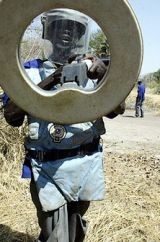Sudan soldiers in Kenya on demining course
May 23, 2006 (NAIROBI) — A group of soldiers from the Sudanese army and their former southern rebel foes began training together in Kenya on Tuesday to learn how to clear landmines they laid during 21 years of civil war.

|
|
A member of the Swiss Foundation for Demining (FSD) team surveys an area near Rumbek, January 2005, to retrieve landmines. |
A peace deal signed between the government and the Sudanese People’s Liberation Army (SPLA) in January 2005 ended what was then Africa’s longest civil war, in which more than two million people were killed.
That deal, which provides for the former combatants to work in integrated military units, has paved the way for some 500,000 refugees to return to the region.
But the rash of landmines in the south is hampering desperately needed development in the region.
“The big problem and big challenge for the Sudan government and the government of the south is to start to clean and to demine,” Gamal Omer Mohomed, Sudan’s defence attache to Kenya, told Reuters.
The group of 163, including 19 civilians, will train over eight weeks at the Nairobi-based International Mine Action Training Centre (IMATC), a joint British-Kenyan military operation that teaches demining for humanitarian purposes.
The groups’ backgrounds could be a challenge, but officers at the mine centre said that could be put aside.
“I think the most important hurdle to overcome is that psychological barrier,” Lieutenant-General Julius Karangi, vice chief of general staff of the Kenyan military, told reporters after addressing the trainees.
“Once they leave this place they’re not supposed to go and behave like northerners and southerners. They are supposed to go there and create an integrated humanitarian demining team.”
As part of the peace agreement between the government and southern rebels, rebels and soldiers formed integrated units, and the mine-clearing training is their first joint course.
“It’s the biggest course that we’ve ever run, and in many ways the most important course,” said Lieutenant-Colonel Tim Wildish, the mine centre’s commandant from the British Army.
